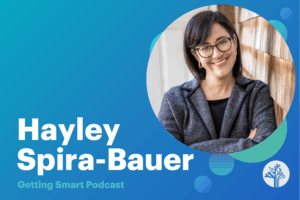Virtual Agreements Help Mitigate Cheating in My Online Classroom

By: Renata Nikolayev
As schools adjust to primarily virtual models, I’m hearing from fellow teachers that they’re worried about a potential rise in student cheating. It makes sense to be concerned about that: without physical oversight—teachers behind a screen, parents trying to manage their own careers—how will students resist the temptation to check in with their friends (including their best friend, Google) for quick answers?
But those of us who have experience teaching online have proven strategies to help mitigate cheating. My favorite one, and perhaps the most effective, is to write a contract.
What does that look like, exactly? During orientation in my language classes, we read, discuss, and sign a joint contract. It’s a vibrant discussion, but most kids are new to the concept of contracts and have probably not signed many (or any!). So I focus on demonstrating the value of the contract right away, and then refer back to it often with several kinds of in-class activities.
One of my favorite examples is through popular songs! We’ll jointly use free online translating tools to translate a well-known song with lyrics we all know by heart back and forth into multiple languages. (I particularly enjoy using Adele’s “Hello,” which I run through a French translation and then back into an English one.) The songs, predictably, end up with nonsensical, outlandish lyrics, which students find hilarious! And because it’s funny, the memory—the moment—becomes cemented in their minds, and they’re able to see firsthand how using shortcuts can make their work sound silly, and then draw on that lesson in the future. (Or at least, that’s the goal!)
We jointly revisit this contract throughout the year to recall the promise they have made to me, to each other, and most of all to themselves. To be successful, the agreement must be rooted in mutual respect and honesty—which in itself is practiced every day in my classes, where we strive to be kind to each other, to uphold each other’s work, and to build an atmosphere where success isn’t an end point; it’s a process.
In fact, in addition to creating a contract with your students, overall, we teachers should strive to cultivate a classroom where the act of cheating itself becomes irrelevant. We should, for example, normalize making mistakes, and teach our students that trying—and failing—are essential parts of the learning process.
In many cases, taking this approach means teachers will have to weigh your grading to reflect the fact that the creative process is more meaningful than the end result. Educational apps like EdPuzzle, WooClap, and FlipGrid can make these demonstrative tasks more fun and engaging for the student while providing data and feedback for the teacher. The great thing is that live, student-centered, dynamic, synchronous classes are the perfect breeding ground for this type of learning to happen!
Another way to emphasize the spirit of the virtual contract is to emphasize project-based learning. Are standardized, static assessments important? Sure. But formative, dynamic check-ins make it easier to avoid cheating—because, by doing so, there aren’t necessarily any right (or wrong) answers. Online instruction assumes that every formal assessment is “open book” when online, and I plan accordingly by changing the format of end-of-unit assessment prompts to be more open-ended.
Of course, this doesn’t mean that I never give multiple choice quizzes or matching and fill-in-the-blank prompts, but rather that these types of assessments are viewed as check-ins for students—a time when they can reflect on how well they may have demonstrated understanding of basic concepts. For me, as the teacher, the crux of their learning is assessed by what they do with this information and how they integrate this knowledge into a larger skill set.
At the end of the day, in my online language courses, the gold standard for proficiency is the ability to produce, unrehearsed and on the spot, both written compositions and spoken dialogue at various language registers appropriate to the social context at hand. Students learn quickly that they simply can’t cheat their way into demonstrating language proficiency in the live setting. In fact, one of my favorite exercises to demonstrate this is when I show my students the myriad (comical!) ways that Google Translate can be wrong. It’s a light-hearted, funny moment in my classes that demonstrates exactly what can (and usually does) go wrong when this tool is misused, and emphasizes to students how silly it would be to use translating tools for their homework.
Trusting students is key—but only because I make it clear that students can trust me to do my best in keeping them engaged and interested in the material, so that they take ownership of their learning.
For more, see:
- Respondus LockDown: Is This the Answer to Prevent Students Cheating on Exams?
- It’s Not About The Grade, It’s About the Growth: 5 New Mindsets for Hybrid Assessment
- 10 Online Tools and Resources That Support Academic Honesty
 Having lived and traveled all around the world from a young age, Renata Nikolayev continues to marvel at the power that language holds to connect us with others’ humanity. With a professional background built on the human dynamics of communication, she serves as Head of Languages at Dwight Global Online School, and continues to enjoy traveling the globe in search of that spark of connection. Follow her on Twitter at @BougeotteRusse.
Having lived and traveled all around the world from a young age, Renata Nikolayev continues to marvel at the power that language holds to connect us with others’ humanity. With a professional background built on the human dynamics of communication, she serves as Head of Languages at Dwight Global Online School, and continues to enjoy traveling the globe in search of that spark of connection. Follow her on Twitter at @BougeotteRusse.
Stay in-the-know with innovations in learning by signing up for the weekly Smart Update.







0 Comments
Leave a Comment
Your email address will not be published. All fields are required.